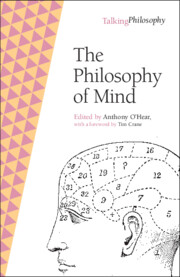Book contents
- The Philosophy of Mind
- Talking Philosophy
- The Philosophy of Mind
- Copyright page
- Contents
- Foreword
- List of Contributors
- Introduction
- The Mind–Body Problem after Fifty Years
- How to Find the Neural Correlate of Consciousness
- Embodiment and the Philosophy of Mind
- Folk Psychology and Mental Simulation
- Understanding Other Minds from the Inside
- Self-knowledge: the Wittgensteinian Legacy
- Joint Attention and the First Person
- Consciousness as Existence
- Setting Things before the Mind
- Perceptual Intentionality, Attention and Consciousness
- Experience and Reason in Perception
- Intentionality as the Mark of the Mental
- Intentionality and Interpretation
- Externalism and Norms
- Mind, World and Value
- Mind, Knowledge and Reality: Themes from Kant
- The Modality of Freedom
- Dualism in Action
- Index
Embodiment and the Philosophy of Mind
Published online by Cambridge University Press: 19 May 2022
- The Philosophy of Mind
- Talking Philosophy
- The Philosophy of Mind
- Copyright page
- Contents
- Foreword
- List of Contributors
- Introduction
- The Mind–Body Problem after Fifty Years
- How to Find the Neural Correlate of Consciousness
- Embodiment and the Philosophy of Mind
- Folk Psychology and Mental Simulation
- Understanding Other Minds from the Inside
- Self-knowledge: the Wittgensteinian Legacy
- Joint Attention and the First Person
- Consciousness as Existence
- Setting Things before the Mind
- Perceptual Intentionality, Attention and Consciousness
- Experience and Reason in Perception
- Intentionality as the Mark of the Mental
- Intentionality and Interpretation
- Externalism and Norms
- Mind, World and Value
- Mind, Knowledge and Reality: Themes from Kant
- The Modality of Freedom
- Dualism in Action
- Index
Summary
Cognitive science is in some sense the science of the mind. But an increasingly influential theme, in recent years, has been the role of the physical body, and of the local environment, in promoting adaptive success. No right-minded cognitive scientist, to be sure, ever claimed that body and world were completely irrelevant to the understanding of mind. But there was, nonetheless, an unmistakeable tendency to marginalize such factors: to dwell on inner complexity whilst simplifying or ignoring the complex inner–outer interplays that characterize the bulk of basic biological problem-solving. This tendency was expressed in, for example, the development of planning algorithms that treated real-world action as merely a way of implementing solutions arrived at by pure cognition (more recent work, by contrast, allows such actions to play important computational and problem-solving roles). It also surfaced in David Marr’s depiction of the task of vision as the construction of a detailed three-dimensional image of the visual scene. For possession of such a rich inner model effectively allows the system to ‘throw away’ the world and to focus subsequent computational activity on the inner model alone.
- Type
- Chapter
- Information
- The Philosophy of Mind , pp. 53 - 79Publisher: Cambridge University PressPrint publication year: 2022

